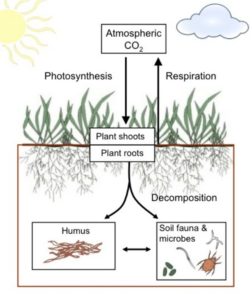Study Finds Some Manure Contributes to Climate Change
We know that cows contribute to climate change, but does their manure contribute to climate change too?
According to a new study, which was conducted by Colorado State University and the University of Idaho and published on October 9 in Ecology Letters, manure from livestock who are given antibiotics can actually contribute to climate change.
Some Manure Does Contribute to Climate Change
To conduct the experiment, researchers studied three contained ecosystems: one given manure from cows administered antibiotics; one given manure from cows not administered antibiotics; and one given no manure. After a seven-day period of soil sampling, researchers discovered that antibiotics caused carbon to behave differently. The carbon’s cycle through the plant’s roots and soil and its exit into the atmosphere as carbon dioxide occurred at a much faster rate than normal. Thus, exposure to antibiotics altered the soil’s microbiome. So manure from cows given antibiotics actually contributes to climate change.
While experiments have previously been conducted to test the effects of antibiotics on soil, these experiments were not realistic, as scientists would directly inject antibiotics into manure or soil. This experiment, however, employed a realistic design that allowed researchers to understand how antibiotics naturally interact with the soil.
And researchers are now concerned.
While antibiotics are useful for treating infections, over-use can lead to antibiotic-resistance. This means that bad bacteria can no longer be killed with antibiotics. According to the CDC, “Resistant germs from the animal gut can also get into the environment, like water and soil, from animal manure. If animal manure or water containing resistant germs are used on fruits, vegetables, or other produce as fertilizer or irrigation, then this can spread resistant germs.”
In the United States, 80 percent of antibiotics produced are administered to livestock. As if this number wasn’t staggering enough, the percentage of livestock antibiotic use is projected to increase by 67 percent in just ten years.
This is bad news for both the environment and people.
Manure, Soil, and Climate Change
Soil, like trees and the ocean, store carbon and keep the planet from warming. But changes to the soil’s microbiome can disrupt this delicate process.

Carbon dioxide is sequestered from the air through the process of photosynthesis. It travels through plants’ roots and into the soil, where it provides nutrients for soil microbes.
This carbon is then either stored in humus, a highly decomposed material that gives soil a rich and dark color, or is released back into the atmosphere through microbial respiration.
It is, therefore, natural for carbon dioxide to be released back into the atmosphere, but not as quickly as it is currently being released.
Many other factors are contributing to increased carbon dioxide levels, such as deforestation via burning and cutting. The depletion of soil organic carbon (SOC) is only exacerbating the global issue of food insecurity, as less SOC means less fertile soil and fewer crops.
This is just one way that antibiotic-administered livestock is negatively affecting us.
The other way?
Our health.
Antibiotic-Resistant Germs
As discussed above, antibiotic over-use can result in resistance. So when we go to the grocery store to buy fruits and vegetables that were grown in manure from cows treated with antibiotics, we can contract illnesses. It’s not just from eating fruits or vegetables, however; eating raw or under-cooked meat that contains antibiotic-resistant germs can make us ill, too.
Obviously, to treat sick livestock and prevent diseases from spreading, farmers must use antibiotics. Yet, many farmers use antibiotics irresponsibly in order to promote growth. Over time, this exposure leads to antibiotic-resistant bacteria.
And while you may see terms like “antibiotic-free” on food packaging, this does not mean that the animal did not have antibiotic-resistant germs in its system. It simply means that any antibiotic medicine left the animal’s system before it was slaughtered.
So what does this mean for humans? How do we keep from getting sick, spreading resistant bacteria, and contributing to climate change?
For store-bought fruits and vegetables, wash them off with warm water before consuming them. This won’t kill any resistant germs, unfortunately. But cooking vegetables and meat will.
For those with a green thumb, however, you might be better off.
Natural Fertilizer
If you grow your own fruits and vegetables, there’s something you can do to keep you and your family safe from these resistant bacteria and to help the environment.
While manure is a natural fertilizer, some manure contributes to climate change, and you can’t necessarily tell if the kind you’re buying is the right kind. Switching to a bottled fertilizer to grow your fruits and vegetables is a better option.
xVital, xVirity’s liquid fertilizer, is a natural fertilizer comprised of two ingredients: nitrogen and water. Thus, it contains no salts, no chemicals, and-obviously-no antibiotics! With xVital, you can grow healthier crops without polluting the environment.
To buy your first bottle, visit our store.
Sources:
Antibiotic/Antimicrobial Resistance
Researchers Find Multiple Effects on Soil from Manure from Cows Administered Antibiotics


